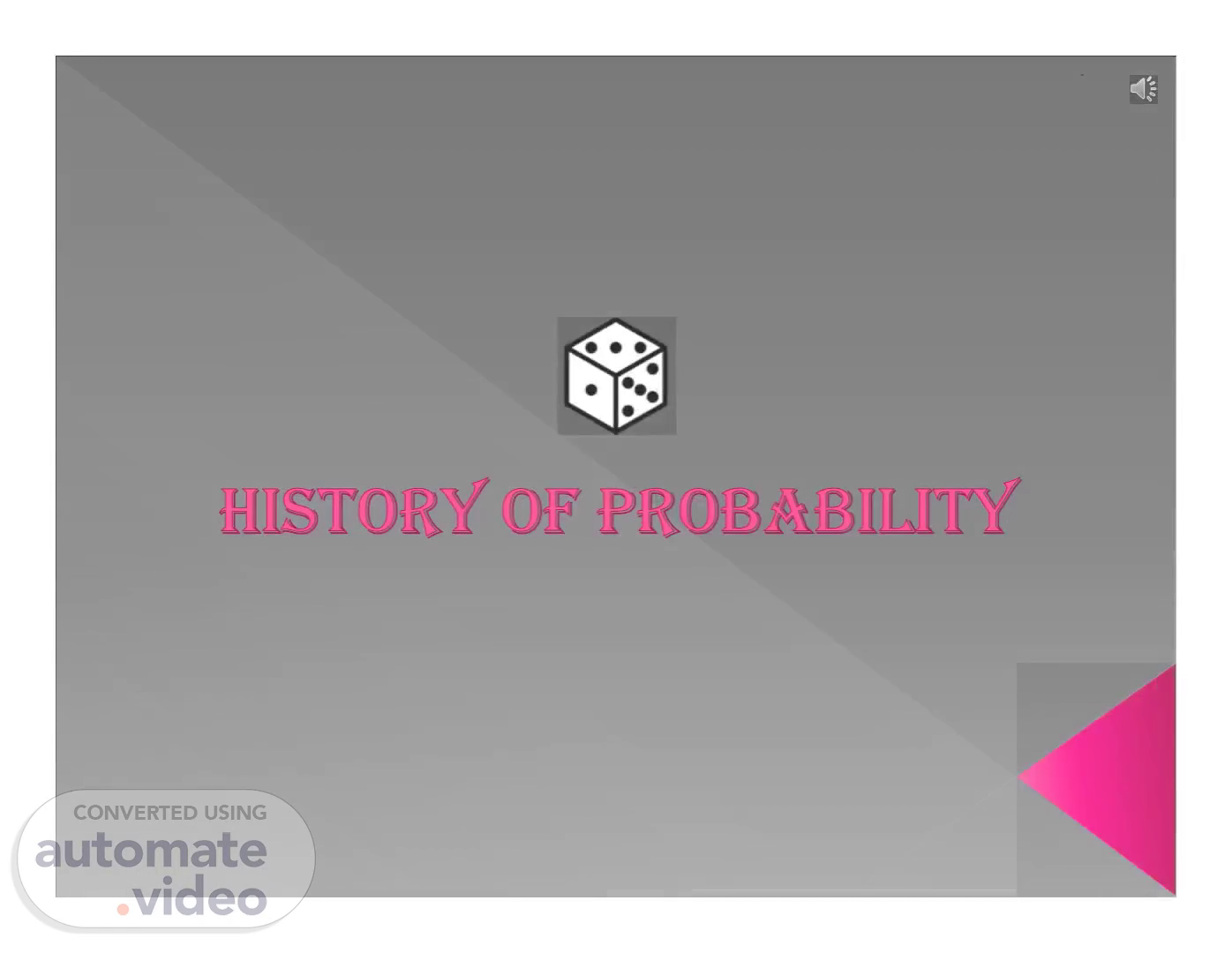
Page 1 (0s)
HISTORY OF PROBABILITY. HISTORY OF PROBABILITY.
Page 2 (8s)
[Audio] Probability and statistics, the branches of mathematics concerned with the laws governing random events, including the collection, analysis, interpretation, and display of numerical data. Probability has its origin in the study of gambling and insurance in the 17th century, and it is now an indispensable tool of both social and natural sciences. Statistics may be said to have its origin in census counts taken thousands of years ago; as a distinct scientific discipline, however, it was developed in the early 19th century as the study of populations, economies, and moral actions and later in that century as the mathematical tool for analyzing such numbers. For technical information on these subjects, probability theory and statistics. See also conditional probability, probability density function, likelihood, and geometric distribution..
Page 3 (1m 38s)
[Audio] Probability has a dual aspect: on the one hand the likelihood of hypotheses given the evidence for them, and on the other hand the behavior of stochastic processes such as the throwing of dice or coins. The study of the former is historically older in, for example, the law of evidence, while the mathematical treatment of dice began with the work of Cardano, Pascal, Fermat and Christiaan Huygens between the 16th and 17th century. Probability deals with random experiments with a known distribution, Statistics deals with inference from the data about the unknown distribution..
Page 4 (2m 44s)
[Audio] The origins of probability can be traced back to the ancient civilizations of Egypt and China, where games of chance were played using dice and other random objects. The Greeks also had a fascination with probability, using it to predict the outcomes of athletic contests and other events. However, it wasn't until the 16th century that probability began to take on a more scientific form, with the development of the theory of gambling by Italian mathematician Gerolamo Cardano..
Page 5 (3m 42s)
[Audio] The 17th and 18th centuries saw a major shift in the development of probability, as mathematicians began to explore the underlying principles behind games of chance. The French mathematician Blaise Pascal and the Dutch mathematician Christiaan Huygens both made significant contributions to the field during this time, laying the groundwork for what would become the mathematical theory of probability..
Page 6 (4m 29s)
[Audio] The 19th century saw the widespread adoption of probability theory, with mathematicians such as Pierre-Simon Laplace and Carl Friedrich Gauss contributing to its development. Probability theory was also applied to a variety of fields, including physics, biology, and economics, and became an important tool for understanding the natural world..
Page 7 (5m 9s)
[Audio] The 20th century saw the continued growth of probability theory, as well as its increasing use in modern society. Probability is now used in a wide variety of fields, from finance and insurance to sports and gaming. It has also become an important tool in the field of artificial intelligence, helping to power algorithms that are used in everything from self-driving cars to personalized medicine..
Page 8 (6m 1s)
[Audio] As technology continues to advance, the future of probability is sure to be an exciting one. With the increasing amount of data available, probability will play a vital role in fields such as artificial intelligence and machine learning. The development of quantum computing may also open up new avenues for probability research, with the potential to solve previously unsolvable problems. Another area where probability may play a significant role in the future is in the field of genetics. With the increasing ability to sequence the human genome, probability can be used to predict the likelihood of developing certain diseases or disorders, allowing for more personalized and targeted medical treatments..
Page 9 (7m 16s)
[Audio] The history of probability is a long and fascinating one, spanning thousands of years and encompassing numerous fields of study. From its earliest beginnings as a simple game of chance to its current use as a powerful tool in modern society, probability has come a long way. Whether we are predicting the weather, assessing risk in the stock market, or simply trying to make sense of the world around us, probability is an essential tool that helps us to understand and make informed decisions..
Page 10 (8m 15s)
THANK VOU....... THANK VOU.......